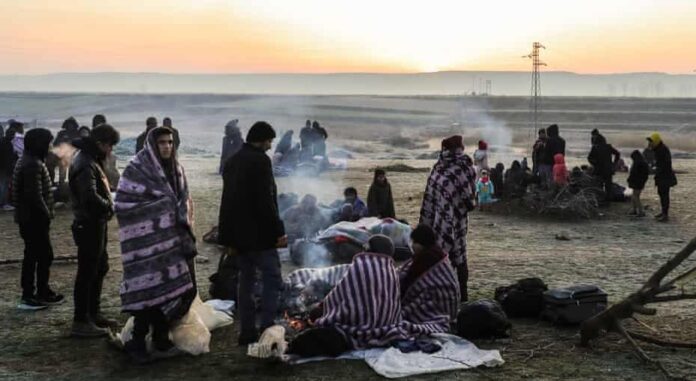US-Led Wars Have Displaced 37m People. America Should Accept Responsibility
By David Vine
Since George W Bush declared a “global war on terror” following al-Qaida’s September 11 attacks, the wars that US forces have launched and engaged in have displaced an estimated 37 million people, according to a new report I helped produce with teams from American University and Brown University’s Costs of War Project.
The 37 million people displaced include 8 million refugees and asylum seekers and 29 million displaced within Afghanistan, Iraq, Libya, Pakistan, the Philippines, Somalia, Syria, and Yemen. Displacing 37 million people is equivalent to removing all the residents of Texas and Virginia combined or almost all of Canada.
Given questions about even the best international displacement statistics, our estimate of 37 million displaced is a conservative one. The true total displaced by the US post-9/11 wars could be closer to 48–59 million – more people than in all of England.
To be clear, the US government is not solely responsible for displacing 37 million people. The UK government and other US allies share responsibility, as do the Taliban, Iraqi Sunni and Shia militias, Syrian dictator Bashar al-Assad, the Islamic State, al-Qaida, and other combatants, governments, and actors.
However, the eight wars in our study are ones the US government bears significant responsibility for initiating (Afghanistan/Pakistan and Iraq), for escalating as a major combatant (Libya and Syria), or for fueling through drone strikes, battlefield advising, logistical support, and other military aid (Yemen, Somalia, and the Philippines). Displacement across these wars has totaled:
- 5.3 million Afghans;
- 9.2 million Iraqis;
- 3.7 million Pakistanis;
- 1.7 million Filipinos;
- 4.2 million Somalis;
- 4.4 million Yemenis;
- 1.2 million Libyans;
- 7.1 million Syrians.
Some may criticize the inclusion of countries outside Afghanistan and Iraq in our calculation. Some may critique the inclusion of Syria (although our conservative methodology includes well under half of those cumulatively displaced since the start of Syria’s civil war). We note that even if we were to focus only on the 14.5 million displaced in Afghanistan and Iraq, that total would exceed displacement in any war since 1900 except the second world war.
If the US does not reckon with the catastrophic effects of its wars there will be no end to the endless wars
The damage suffered by those forced to flee their homes has been profound. Displacement has impoverished people economically, psychologically, socially, and emotionally. Mass displacement has harmed host communities and countries, which have faced burdens hosting the displaced. Mass migration to Europe has fueled the rise of the far right and racist and nationalist movements worldwide. These movements have helped orchestrate backlashes against refugees in places such as Germany and France; since 2016, much of Europe has blocked the entry of refugees, trapping people in often abysmal conditions in places like Lesbos, Greece.
The US government has turned its back on the vast majority of the displaced. Since 2001, the US government has admitted just under 348,000 refugees from the entire Middle East. By contrast, Turkey currently hosts 3.9 million refugees and other displaced peoples. One in every seven and one in every fifteen people in Lebanon and Jordan, respectively, are refugees. In recent years, Canada has resettled more than 10 times as many refugees per capita as the US. Under the Trump administration, US refugee admissions have fallen to near zero amid a ban on admitting refugees and other immigrants from several Muslim-majority countries.
US leaders could have supported far larger numbers of the displaced. Republican and Democratic administrations have done it before. In the wake of the war in Vietnam, Cambodia, and Laos, the US government admitted more than 800,000 south-east Asian refugees.
While many assume that refugees are a financial burden on host countries, German leaders received almost 900,000 refugee asylum applications in 2015 not just out of feelings of historical obligation related to the Nazi Holocaust but also because they understood that refugees are an important new workforce given an aging German population.
As the grandchild of Jewish refugees who fled Nazi Germany, I believe US citizens have an obligation to repair damage caused by the post-9/11 wars, including the displacement of tens of millions of people and millions of deaths and injuries. After ensuring Trump leaves office, we must renew a commitment to welcoming the world’s “tired … poor … huddled masses yearning to breathe free.”
We must commit to supporting at least 250,000 refugees per year for at least the next decade. We must significantly increase support for refugees upon their arrival in the US. While the country is the top donor to the UN refugee agency, UNHCR, the US should more than double its contributions to at least $5bn (still a small sum). Britain and other nations that have waged war alongside US forces should make comparable efforts at repair.
Those concerned about the cost of such efforts should look at the $740bn annual US military budget, which exceeds that of the next 10 countries combined: the money is there. We will free up more taxpayer funds by responsibly ending nearly two decades of war and what has become a permanent war-funding machine.
If the US does not reckon with the catastrophic effects of its wars – and if we don’t fundamentally question the legitimacy and efficacy of war, given 19 years of disastrous results – there will be no end to the endless wars. The endless wars, in turn, will continue to displace millions more than the 37 million who have already fled home.
David Vine is Professor of Anthropology at American University in Washington, DC. Vine is the director of the American University Public Anthropology Clinic and a board member of Brown University’s Costs of War Project. The views expressed here are Vine’s alone




